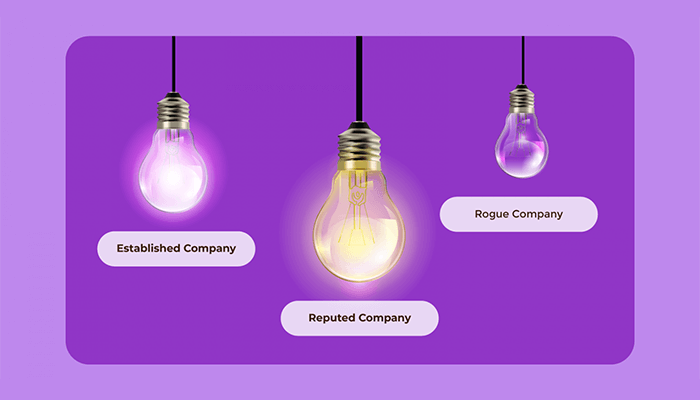Are you a small to medium-sized business (SMB) thinking of outsourcing overseas to a country like India or the Philippines?
If ‘yes’, then before you outsource, you first need to be aware of the three different types of offshore outsourcing companies that you would come across out there. More importantly, you need to be aware of the possible implications of partnering with each one of them in your pursuit of outsourcing success.
In my previous blog post – 13 Reasons Why You Need an ‘Outsourcing Guru’ – I explained that because SMB outsourcing takes place remotely, clients often don’t know who they are dealing with and this can make choosing a legitimate outsourcing firm difficult.
Since clients rarely go on-site to assess a vendor, they need to know how to ‘peel the veil of a vendor website’, so that they get to know just who they are truly dealing with. This ability, to be able to remotely evaluate a vendor for what they truly are, rather than what their website claims to be, is critical to your outsourcing success.
To be able to ‘peel the veil of a vendor website’, you first need to have a clear understanding of what I consider to be the three different types of outsourcing companies you will find in operation:
- Rogue
- Established
- Reputed
These three distinct categories comprise the subject of this blog post. Let’s discuss them one by one.
What is a Rogue Outsourcing Company?

A rogue outsourcing company is not an established or proven entity – simply because it has a poor success rate. Such vendors often lack the technical capability, operational diligence and professional set-up required to provide the services for which they are advertising. Rogue companies basically have a lack of commitment to professionalism and quality results.
A rogue outsourcing company typically consists of only a handful of staff. That, too, often comprises a group of friends. The ‘staff’ may work from home or a small and poorly equipped office.
While, in name, these vendors may be legal entities, they do not, by all reasonable standards, meet any of the infrastructure, standard operating procedures, policies, professionalism, business acumen, track record, certifications and all the other capabilities one would expect from an established or reputed business. These firms are not ‘real companies’ by any stretch of imagination. They are ‘Cowboys’ or ‘Mom and Pop’ shops.
The set-up and capability of such vendors are more in line with what one would expect from a freelancer. Often the quality of service one gets from such companies is worse than what one would get from freelancers. That’s because rogue vendors are often more confident and ambitious than individual freelancers; and because they have larger teams, they chance their arm and bid for complex projects. More often than not, despite this self-confidence, rogue vendors are unable to successfully deliver highly complex projects. In reality, these firms differ little from offshore freelancers. The only difference is that they have a website and a third-rate office.
Why are There So Many Rogue Outsourcing Companies & How Do They Survive?
Why would you start a company when you have inadequate funding? It is hard for a client to understand the ground realities in offshore destinations, but I will attempt to succinctly explain why. Basically, there are three key reasons. Let’s study them one by one. Firstly, outsourcing is India’s ‘golden ticket’. Over the past three decades, the industry has brought to the country millions of jobs and over $100 billion of FDIs (Foreign Direct Investment) per year. As many as 50% of the Fortune 500 companies outsource their IT workload to India and more than 750 R&D centres have been set up in India by multinational corporations.
Naturally, a lot of rags-to-riches stories are associated with this offshoring trend. Many people have jumped onto the outsourcing bandwagon, irrespective of whether it really made sense for them to do so.
When I started VirtualEmployee.com back in 2007, we disrupted the outsourcing industry with our unique business model. But, before we even knew it, we found websites everywhere copying our model and even our name – there was a VirtualEmployee123.com or VirtualEmployeeXYZ.com popping up every other day! Well, it’s a fallout of the cut-throat competition in the hot pursuit of the outsourcing dollar.
Now we come to the second factor. A lot of people who start rogue outsourcing companies themselves don’t know that they have limited funds to begin with. They don’t know what it’s like to run a business on par with international standards. That’s because they don’t know what international standards are.
Many rogue vendors know that their standards are below par, but they have the attitude – audacity, to be precise – to go about their business because they know that they are remote and can get away with cutting corners.
It may seem like a harsh verdict, but it’s the truth. I met one company director in Australia who told me that when he visited his outsourcing vendor in India, he discovered that his software developers were sitting on plastic garden chairs at work. For such companies, what you or I would consider unacceptable is actually the norm.
This might seem exaggerated, but it’s true. Many clients have come aboard VirtualEmployee.com after having worked with outsourcing companies in the Philippines and India that failed to give their resources basic facilities. The video clip below, from Spencer Freeman, the CEO of Freeman and Sons, powerfully illustrates this point:
For a rogue outsourcing firm, if an employee works for two clients simultaneously, it’s okay. If you keep saying ‘yes’ to everything that the client requests, even though you know that you can’t do it, it’s still okay. If your office has no air conditioner and it’s 50 degrees Celsius out there, it’s still okay. If they provide a client with an unqualified junior resource and have him or her shadowed by a senior (as Spencer points out in the video), it’s still okay. If the employee you are working with has poor communication skills, it’s okay as the following video clip from Blake Morgan, the CEO of Optimize Overseas, illustrates:
Please don’t have me mistaken, though. Just as there are companies that woefully fall short of expectations, there are just as many that remarkably exceed expectations, which I will touch upon later. A lot of offshore companies are fully aware of what is acceptable as per international standards. You get both types of mind-sets in offshore outsourcing destinations. Those that know and will actually often surpass the levels of professionalism that’s commonplace in the West ), and equally those that fall well short of it.
Let’s talk about the third factor now. Starting an outsourcing company in India and the Philippines is very easy. There are three reasons behind it. Firstly, getting clients is easy because you have freelance websites like UpWork and Freelancer.com. On such sites, you can acquire clients without having any marketing expenses.
Two, rogue vendors invest very little in their companies – after all, no one is going to actually visit them. So, they don’t need heavy start-up capital. With next to no expenses – and that includes marketing expenses – rogue firms are able to offer highly competitive rates.
Thirdly, as I have already touched upon, because outsourcing takes place remotely, clients are poor at judging the true credibility and capability of a rogue firm (hence, why it’s so important to be able to “see what lies behind the veil of the vendor website”). By the time a client is enticed by a rogue vendor’s ridiculously low rates, it’s often too late. They become blind-sighted and no longer focus on diligently assessing the vendor.
Clients rarely appreciate just how poor the set-up is of the company they are about to partner with. The only thought on their minds is – “I am going to be spending only $3 per hour, this is great!” This may seem like an exaggeration, and if you think so, I would recommend that you watch the following video clips:
In short, despite their lack of capability, rogue firms are, for the above-mentioned reasons, invariably able to win contracts. In other industries, this is not customary – most of the time, rogue companies are quickly found out. If clients actually went on-site and visited the vendors, there would be no rogue outsourcing companies, because no one would partner with them.
So, on the one hand, you have the pull of what is a booming and attractive industry, and secondly, you have a low barrier of entry. This, in short, is why so many rogue outsourcing companies start up. But if these companies lack capability, why are so many of them able to survive? Well, there are three reasons behind this:
Firstly, rogue outsourcing companies rarely get ‘caught out’. They are too small and they don’t have any reputation or brand name. So, even if they produce poor-quality results, a client won’t be able to ‘pin it on them’. Rogue firms can fold up today and restart the next day with a whole new site. Secondly, prospective clients don’t learn from the lessons of history. Clients keep partnering with rogue firms because they want the lowest price possible.
In fact, the obsession that some clients have with cost is unbelievably strong. There are clients that are only willing to pay $2 an hour for skilled professionals. Either because they cannot afford more than $2 an hour or because they think anything more is unreasonable, or quite simply because they have become so hypnotized by low rates that they cannot think past them.
Lastly, by rogue outsourcing company, I don’t mean a company that is wholly incapable. Rogue firms have a “poor success rate; this doesn’t mean every single project they work on is delivered poorly. Rogue firms will have some happy clients, and once again, this keeps the company “above float”. The issue with rogue vendors is that their probability of success is low (more about this in the next section). Remember, that these entities have small offices and a highly compromised set-up. A handful of clients or projects are often enough to keep them “ticking by”.
Do Rogue Outsourcing Companies have a Market Place?
Yes, they do.
Given everything I have said above, you might be surprised to hear me say this. But the issue with rogue outsourcing companies is not that they cannot complete some projects successfully. They can, of course. Rather, the issue with rogue outsourcing companies is that, because they have limited capability, they have a low probability of success.
And the probability of failure increases in direct correlation with the complexity of the project. This does, however, mean that rogue vendors do end up completing some projects successfully.
For a profitable business, if a project fails:
- The amount of time and energy you will have to invest in doing a ‘clean-up’ job will not be worth the risk. The opportunity costs are simply too high to be wasted on immature business matters, such as unqualified staff or poor internet connectivity;
- The direct losses may be too high. If you are working on a project for a client that’s worth $0.5 million, there’s a lot more to potentially lose than gain by working with a rogue vendor;
- Established companies often cannot partner with a rogue vendor because their own internal policies will mandate that they only partner with companies that maintain a certain standard of operating procedure – that is, data security, disaster recovery, contingency plans, etc.
It is worth keeping in mind that when clients have a negative outsourcing experience, the probability that they will attempt to outsource again dramatically declines. This prevents clients from realizing and experiencing the huge “wins” they would have achieved had they partnered with a reputed firm. In this respect, the potential opportunity cost is once more very high and thus a high incentive for staying away from rogue firms, for those clients prudent enough to think along these lines.
Nonetheless, just like freelancers have a market, so do rogue outsourcing companies. And as mentioned above, because some clients have “tunnel vision” when it comes to cost, rogue firms are the only entities that can potentially serve this market audience. But in my opinion, that market place is for individuals/start-ups that have uncomplicated, low budget, low value, low risk, short-term projects.
For a longer-term/complex project, however, even for a start-up, I wouldn’t recommend working with a rogue firm. The risks simply become too high. If, after six months, or nine months your project fails, the financial implications and opportunity cost losses are significant even for a start-up.
In such a scenario, if you cannot afford the services of a reputed firm, then it might be better to park the project all together. Low rates may be appealing, but if your project is not delivered as desired, the fact that your expenditure was minimal is going to be of little consolation.
The question to ask yourself with a rogue outsourcing vendor is – “do you want to take the chance that there’s a high probability your outsourced work will fail?” Some clients might be okay with taking this risk and that depends on circumstances. If you have a severe lack of funds, you may feel this is your only opportunity and thus see the move as a calculated risk.
Where a project is intricate and complex, rogue vendors will profess that they do have the full capability to meet a client’s expectations. And this is a core reason as to why I regard such vendors as rogue, because such vendors will pitch for projects they are totally incapable of and unequipped for delivering – and that is unethical. They may not even have the qualified staff on board, but when pitching to clients, they will find elaborate methods of persuading them.
For instance, say you wanted to outsource a mobile app project, and say the rogue vendor doesn’t have such skills in-house (unless the founders of the entity happen to be mobile app developers themselves). They may ask someone in their network to present themselves to you during their pitch/correspondence (yes, this is how such vendors operate!).
Once you start working with them, only then will you see their true shortcomings. The individual you initially spoke to at the time of the pitch won’t actually be working on your project. Such hoodwinking sounds very strange, but as Spencer Freeman said in the video clip above – “They gave us a very inexperienced person, and we could tell while working with them that this person was being shadowed by somebody else on their side.”
I once came across a rather bemusing testimonial on a rogue outsourcing vendor’s website (despite the temptation, I won’t name the vendor). In the testimonial, the client was praising the results and the project manager that delivered the tasks. The only anomaly was that the project manager was also the ‘CEO’ of the company. Do you see what’s wrong with this? You might be thinking, “The client has given a positive testimonial – nothing is wrong with that!” I suspect many clients think that way. And that’s another reason why rogue companies continue to survive.
Let’s carefully think about it. While, yes, it’s true that the testimonial is positive, just think about the implications of the project manager also being the ‘CEO’ of the company. What does that say for the calibre of the remaining staff within that organization? It says a lot.
The reason the CEO is assuming the role of the project manager is because it is a small entity and there is no one else in the organization that has:
- The communication skills, and:
- The project management skills to handle the client’s assignment successfully.
If the CEO left his staff to their own devices, they may not be able to get the work done – it means the CEO clearly has no faith in his team. If you were outsourcing a project to a local company, would you not be slightly surprised if your point of contact was the CEO? In many cases, probably yes. Why then is the same not true when outsourcing overseas?
And this is also why success with such rogue vendors is such a hit-and-miss affair. What will happen if this company picked up, say, another two lengthy and complex projects? Is the CEO now going to act as the project manager for all these new clients too? And, probably, the answer to this is – yes. What if, not two, but four or six new clients started to work with his firm, what happens then? How many clients can one project manager manage before the process is going to get too complex and break down? You might argue that the vendor might hire additional project managers and so everything might turn out just fine. This is true. But in reality, just how much of a practical solution this actually is, is questionable. As soon as this vendor acquires more projects than they can currently adequately manage, one way or another, things will start to get a little sticky. Corners will be cut and that is when your work can very easily take a big hit.
This testimonial also reiterates the point I made earlier about the mind-set and business acumen of rogue firms, that is, rogue firms themselves don’t know that they are falling below international standards. In my opinion, this testimonial doesn’t reflect positively on this organization’s capability. To me, it demonstrates the vendor’s lack of capability.
Rogue vendors don’t see this ‘angle’, though. They lack the business acumen to see why this testimonial is actually rather embarrassing. The testimonial is a great example of how rogue vendors operate and why you should think very carefully before working with such an organization.
This is one of several reasons why you have so many mixed reviews on outsourcing overseas! If you pay close enough attention to these small tell-tale signs, like a testimonial where the client is praising the CEO, you will easily be able to start identifying rogue vendors yourself.
As a side note, tell-tale signs don’t mean that nothing ever goes wrong. This is a mistake that clients frequently make. What you want to look out for is signs of illegitimacy, that is, vendors that say they provide software development services but cannot provide any software development client references. The mistake clients make is to take something going wrong as a sign of illegitimacy. This is a mistake because no business is ever 100% seamless. Things can always go wrong. They often do.
We once had a situation where a client terminated our services because their Virtual Employee fell ill on the first day. In the eyes of the client, this was “not a good start” as it made them circumspect. The truth, however, was simply that their VE was genuinely ill on the first day. It’s rare but it’s going to happen when you have close to 1600+ staff.
Now that we have a clear understanding of what a rogue outsourcing company is, let’s learn about the two other types of outsourcing companies.
What is an Established Outsourcing Company?
An ‘established outsourcing company’ is one that, unlike a rogue outsourcing firm, meets at least the minimum standards we would expect from a legitimate business. What minimum standards are these? They are the same standards that I mentioned when I described a rogue outsourcing company. So, an ‘established’ outsourcing company will have at least an acceptable standard of infrastructure, standard operating procedures, policies, levels of professionalism, business acumen, track record, calibre of staff, certifications and the all-round capability one would associate with a legitimate business. An ‘established outsourcing company’ is an entity that has a credible track record and is ‘fit for purpose’. It has the capability to deliver the services for which it is advertising and bidding upon.
If an established outsourcing company has a ‘credible track record’, then how is it different from a ‘reputed’ outsourcing company? To understand the difference, first we need to define what I mean by a ‘reputed’ outsourcing company.
What is a Reputed Outsourcing Company?
A ‘reputed’ outsourcing company is one that maintains the highest levels of operations in all respects, whether that is in terms of calibre of staff, professionalism or the company’s facilities. While we can talk for hours about factors such as delivery models, manpower, experience, infrastructure, processes, standard operating procedures, cost of service and so on, the single most defining aspect of a reputed outsourcing company will be its very strong and proven track record. In the outsourcing industry, ultimately this one yardstick is by far the most important of all – the ‘success rate’ of a company.
Admittedly, there’s no way we can objectively assess and compare the success rates of all the outsourcing companies. This exercise of comparing and evaluating track records and success rates obviously is always going to be an unfair assessment. However, you can still get a fairly rough idea and feel for the reputation of an outsourcing company. You can see:
- what clients are saying about a vendor
- the type of clients an outsourcing company has and is currently working with
- the projects they have undertaken
- the diversity and complexity of those projects
- the number of companies vouching for a vendor
- the number of years a company has been in operation
While we cannot always objectively conclude a direct comparison, that is, company A is better than company B, if we look at the above indicators, more often than not we can accurately determine if a company falls under one of the “reputed,” “established” or “rogue” categories.
If you cannot find such information as mentioned above about an outsourcing company, then you can safely assume that the firm is not a reputed organization. In short, the hallmark of a reputed outsourcing company is that it has a very strong and proven track record. That’s why I coined the phrase ‘reputed outsourcing company’.
Why is Proven Track Record So Important?
A strong track record is incredibly difficult to attain – especially in the outsourcing sector. It cannot be forged. It means a certain vendor is doing something consistently well and different from the majority of its contemporaries. By definition, you can only be a top-ten percentile company if your mode of operation is different from the norm.
Hence, because building a strong track record takes years of effort, hard work and skill, only the very elite companies reach these heights. So, a strong track record is like a certification, a verification that you are in the hands of a company that you can trust, a company that won’t compromise on quality and cut corners and will, at all times, maintain the highest standards throughout its partnership with you.
If an outsourcing company doesn’t have a very strong reputation, while you may still get a great result with them, the difference is that the firm hasn’t proved that this is a highly likely outcome. The consideration here is one of probability. With reputed firms, you have a high level of confidence before working with them. You will have a high probability of success and that, too, the first time. When success means you can reduce your expenses by 70-80% (plus a whole host of other advantages), being able to hedge on a high probability of success is incredibly invaluable.
This difference between reputed and rogue outsourcing companies was again made by Blake Morgan when he said, “If you need a project done right the first time, and you need to find someone highly qualified to do it, Virtual Employee is going to be able to provide that for you ,” (I apologize for using the example of VE; however, I feel it’s pertinent to share this point. If you want the comfort of a high probability of success and that, too, at the first attempt, take your work to a reputed firm. This is exactly the same point that Blake Morgan is making).
Consider the following options. Which one would you go for?
- Option 1: A 95% probability of attaining an 80% cost-saving
- Option 2: A 65% probability of attaining a 95% cost-saving
- Option 3: A 30% probability of attaining a 120% cost-saving
Clients don’t realize, that when they are choosing an outsourcing vendor, they are making a choice between one of the above three options. You should ask yourself the above question before deciding who you outsource with. As you would have guessed, the above three options correlate to the three different types of outsourcing firms – reputed, established and rogue.
In an industry that receives mixed reviews (some clients claim they saved millions of dollars by outsourcing and some share horror stories), in my personal opinion, solid proof counts for everything. It has value. A value that shouldn’t be underestimated, but then it often is by clients. The opportunity cost loss of getting outsourcing wrong simply is not worth it for most businesses, as the above example shows.
Another interesting side point about the mixed reviews on outsourcing is that if they were to be dissected on the criteria that I have outlined – that is, reputed, established and rogue – you would find the vast majority of negative experiences being attributed to rogue firms. Outsourcing reviews are in desperate need of a cohort analysis.
The Difference between an Established & a Reputed Outsourcing Company
So a stronger and more proven track record will be the most obvious differentiating factor between an established and a rogue outsourcing company.
While it’s true that an established firm “has the capability to deliver the services for which it is advertising and bidding upon,” a reputed firm has a higher probability of successfully delivering services than an established firm. It must be noted that no outsourcing company, whether based locally or overseas, has a 100% success rate.
We can, of course, go further than just reputation. As it should by now be apparent, you will see many differences in the set-up, the quality of service and mind-set of a reputed vs. established firm upon close inspection. For example, an established vendor might have adequate infrastructure, but a reputed company will have world-class facilities on par with the best offices you would find anywhere in the US or in Europe.
A reputed vendor will attract more highly qualified and capable staff. An established vendor might have process control, but a reputed firm will be ISO or CMM level certified. A reputed outsourcing company will provide its staff with transportation to and from the office, but an established vendor will not. A reputed firm may be open 24 hours a day – it might have a customer support department. But an established vendor might only be open during a 12-hour window.
Many small differences such as these will help you identify the differences between a reputed and established vendor. But, because so few clients go on-site, very few are able to see and appreciate these differences and thus they often incorrectly conclude that an established vendor is “on par” with a reputed vendor.
Earlier, I touched upon how rogue outsourcing companies don’t know that they are providing poor-quality services. This same principle applies here, too. Established firms will either not know or not appreciate the importance of implementing the highest standards. Professionalism, business acumen, mind-set and capability work on a scale of degrees, not “notches,” – it’s a sliding scale. Established outsourcing companies don’t cut corners like rogue firms, but at the same time, they don’t strive for the heights of reputed firms either.
This mind-set and level of professionalism spills over into factors such as rapport and relationship. It may just be small things, like you might find it easier to speak to and explain your requirements with an account manager from a reputed firm than one from an established firm (that’s because a reputed firm has the awareness of the type of account manager that should be recruited whereas an established firm may not be as finicky about standards for a ‘peripheral’ position). If you have any problems, you will find a reputed firm quickly picks up and understands your grievance, but this may not necessarily be the case with an established vendor.
Being on the same wavelength and easily understanding one another are factors rarely touched upon when deciding how to outsource. But they are critical. If you have enough interaction with an established vendor versus a reputed vendor, you will start to see these differences for yourself.
You will just feel more comfortable working with one vendor over another; that one outsourcing company just “gets you” and thus feels more seamless to work with. Over time (and that is the problem, such factors are not easy to assess in the beginning when speaking to several outsourcing vendors, but rather are more easily appreciated once you have worked with a vendor for some time), such “easy” interaction is what will ultimately lead to strong rapport with one outsourcing company over another. This leads to better results and a higher probability of attaining positive results.
These are the sometimes subtle, but sometimes very obvious differences between an established and a reputed outsourcing company. A reputed outsourcing company is just that one notch higher, they just go that extra mile. And it’s that extra mile that often makes all the difference in the business world. Reputed firms just “get it”, they have that awareness and understanding of the standards one would expect in the US or Europe and – trust me when I say this – they often surpass them but certainly don’t fall short of them.
Final Thoughts
It’s worth noting that the rates of a reputed outsourcing company will be higher than those of a rogue and established outsourcing company. A reputed outsourcing company is overall providing a lot more service. Naturally, the vendor is going to charge for this and their proven reputation.
You need to decide if you want these extra services. Do you want your staff being picked and dropped off by a company bus when commuting to and from work? Do you feel it’s important and will positively impact your work? Maybe you do feel it’s important, but maybe you feel it’s an unnecessary cost. Do you want to partner with a company that has a contingency plan in place should there be a massive power outage? Do you want to have a customer support department open 24 hours a day, so that you can contact them at all times, or do you feel you can get by without? Do you want to work with the highest calibre staff in your given profession?
The second key factor has to do with the level of risk you are happy to take. The extra mile that reputed outsourcing firms take naturally spills over into a higher quality service, quality control and more qualified staff. This leads to higher success rates.
You have a higher probability of success with a reputed vendor over an established vendor, which has a higher probability of success over a rogue vendor. Regarding the quality of service you feel is needed to successfully outsource and the level of risk you want to take, is something ultimately only you can decide, which will be influenced by your specific circumstances, such as the value of the work you are outsourcing.
Now that we have clarified in detail the differences between a rogue, established and reputed outsourcing company, it’s now time to look at just what techniques we can use to ‘peel the veil of an outsourcing vendor’s website’. Some of the techniques I have indirectly already touched upon in this blog post. But now I will show you explicit techniques that you can use.







